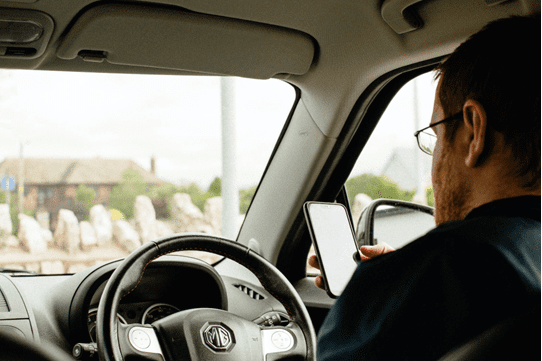Don’t touch that phone!
Motorists are being urged to understand and act on new laws concerning use of smartphones and portable devices whilst driving to avoid fines, points and potential driving bans.
It’s been over six months since new mobile phone laws were introduced, yet Brits are still confused over what they can and can’t use their smartphone for when in the car.
Experts at LeaseCar.uk and its sister site LeaseElectricCar.co.uk have cleared up the confusion by telling drivers what the latest rules on using their phones and devices means in practice.
Following the law change on 25th March 2022, it is now completely illegal to hold and use any mobile phone, sat nav, tablets and other devices which can send and receive data, whilst driving.
Motorists are permitted to use phones in certain circumstances, however, such as making a 999 call or a contactless payment at a drive-through restaurant while the car isn’t moving.
Hands-free access (such as through voice-command systems) is also allowed under the new rules, so long as motorists aren’t holding the devices as they drive.
This means that a smartphone displaying a maps app is allowed if it is in a cradle and not touched by the driver while driving, but confusingly the same rule doesn’t apply to a fixed car infotainment system which the driver can touch.
Furthermore, if the cradle holding the smartphone or aftermarket sat nav device is placed in a position deemed to be obstructing sight of the road and traffic ahead, then a fine and points could soon follow.
A spokesperson for LeaseCar.uk said: “There is still some confusion around the law changes in March with what you can and can’t do when using mobile phones and other devices – to put it simply, it is now completely illegal to hold and use these devices whilst driving.
“Of course there are a few exceptions, like when you’re making a 999 call, but you should make sure to be completely clear on these exceptions, or potentially face a hefty fine and points on your licence.
“It can be easy for us to get distracted by messages, calls and notifications popping up on our phones or wanting to quickly change the song that’s playing. It’s a good idea to stick your phone in the glovebox, out of sight, to not get distracted at all.”
The law change closes a previous loophole which technically permitted drivers to use and hold their phones, as it could be argued they were not using devices for ‘interactive communication’, as the law previously stated.
Devon and Cornwall councils are currently trialling mobile phone detection cameras which take pictures of motorists to see if mobile phones or other devices are being used or held whilst driving.
These cameras could later be rolled out across the country, making roads safer and prosecuting those for breaking the law.
It is now completely illegal for those behind the wheel to even hold their phones and devices, even if it is switched off.
The Highway Code makes it very clear that this law still applies to drivers stopped at traffic lights or in queuing traffic; when supervising a learner driver; or using a car which has automatic stop-start technology.
However, there are some exceptions to the rules surrounding mobile phone and touchscreen device usage which drivers need to stay aware of.
In an emergency, motorists are legally allowed to call 999 or 112 whilst driving if it is impractical or unsafe to otherwise stop the vehicle.
Other exceptions are if the car is safely parked up, the driver is making contactless payment in the car which is not moving (such as in restaurant drive-throughs), or using a device to park a vehicle remotely.
There are also rules when operating devices which have hands-free access – drivers are able to make use of hands-free devices in their cars, so long as they aren’t holding them whilst driving.
Hands-free access devices include Bluetooth headsets, voice command systems, windscreen mounts, dashboard holders or built-in sat navs.
If drivers wish to turn off or otherwise use devices with hands-free access, such as changing directions on sat-navs and map apps, they must pull over and park up safely to operate the device legally.
Motorists caught holding or using mobile phones or other touchscreen devices whilst driving could face up to six points on their licence and a £200 fine, and for those who have passed their test in the last two years, their driving licence could be stripped away completely.
For more on understanding recent motoring law changes in the UK, head over to https://leasecar.uk/

| [donate]
| Help keep news FREE for our readersSupporting your local community newspaper/online news outlet is crucial now more than ever. If you believe in independent journalism,then consider making a valuable contribution by making a one-time or monthly donation. We operate in rural areas where providing unbiased news can be challenging. |



















